

Johannesburg, May 27, (People's Daily Online) -- Professionals and scholars called on an active role of the media in providing information about the Covid-19 pandemic at a China-Africa media webinar held on May 26, 2020.
With the theme of Media's Role in the Fight Against COVID-19 Pandemic, the webinar, hosted by ChinAfrica magazine, was attended by media professionals and scholars from China and South Africa.
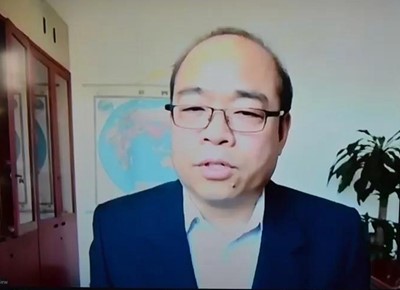
Li Jianguo, Associate Editor-in-Chief of BEIJING REVIEW
Li Jianguo, Associate Editor-in-Chief of BEIJING REVIEW, stressed the role of the media in maintaining social stability and boosting confidence of the public during the epidemic.
"Chinese media provided a large amount of useful information to the general public, including the latest development of the pandemic and personal prevention measures. People could make judgments based on what they learned from the media," Li said.
ChinAfrica has published four issues with cover reports focusing on the novel coronavirus. The March issue detailed China's actions and the stories of medical workers in the battle against the disease; the April issue covered China's efforts at the community level to prevent further spread of the virus; for the May issue, the magazine reported Africa's efforts in combating the disease as it spread to more African countries; and the June issue will look at how the Chinese economy is gradually recovering as the epidemic is basically contained in the country, Li introduced.
"I call for increased cooperation between Chinese and African media in fighting COVID-19. We should share more valuable information and experience that have proven to be successful and effective," said Li.
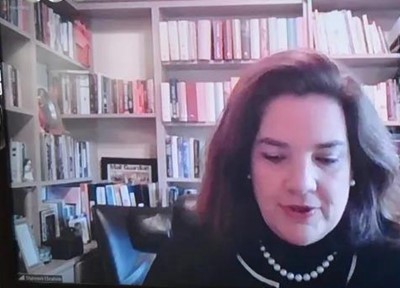
Shannon Ebrahim, Group Foreign Editor for Independent Media
Shannon Ebrahim, Group Foreign Editor for Independent Media, stressed the importance of spreading true and accurate information during the process of fighting COVID-19.
In her opinion, some information given by the media about the pandemic is largely incoherent, unreliable and very confusing to most people on what should be done. She said that the media is a powerful force in shaping opinions and how we experience the world. The role of journalists should be to provide effective health communication, especially related to prevention measures, and curtail misinformation.
"We know that World Health Organization (WHO) Director General [Tedros Adhanom Ghebreyesus] has said that this is a time for science, not rumors, and a time for solidarity, not stigma. I think that is very important," she said.
She noted that media should go beyond just reporting numbers. "We have almost become desensitized to what the numbers mean. We need to try to get the story behind the numbers," she said.
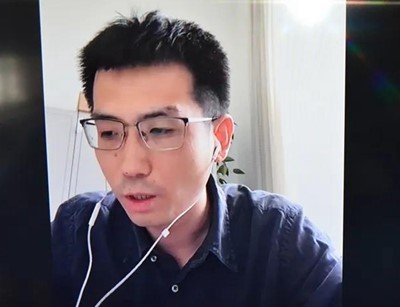
Zhang Pei, Chief of International Cooperation Division, External Relations Department of People's Daily
Zhang Pei, Chief of International Cooperation Division, External Relations Department of People's Daily and Representative of the Secretariat of Belt and Road News Network, mentioned misconduct of some Western media in reporting the pandemic. "We regret to see some Western media organizations politicize the pandemic, fabricate and spread ridiculous opinions without considering facts. This reflects their inopportune ignorance and arrogance, as well as the disregard to the life and health of all human beings," he said.
He noted that now more than ever, people need objective and accurate information and the role played by the media is more crucial than before. A responsible media should play a constructive role in promoting global cooperation and fighting the pandemic together.
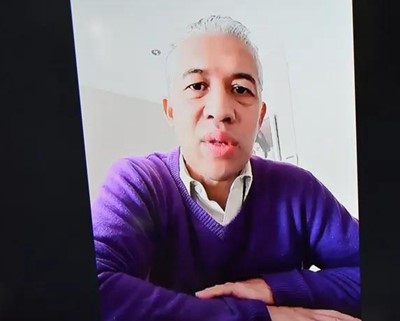
John Bailey, eNCA Input Manager and National Assignment Editor
Speaking on the role of TV, John Bailey, eNCA Input Manager and National Assignment Editor, said that he and his colleagues started to plan programs to spread more useful information about the novel coronavirus to the public after the WHO declared the coronavirus outbreak as a pandemic.
"We are making sure that we report in a very responsible way. We know how important the role of the media is during this time," he said.
Bailey and his colleagues are now focusing a lot on how the governments of China and the ROK are dealing with the virus.
According to Bailey, eNCA has produced various videos on the city of Wuhan, the previous epicenter of the COVID-19 in China, with focus on how the government has helped people deal with the virus. "In general, we have had very positive feedback from South Africans, and it's good to get their views on the situation," Bailey added.
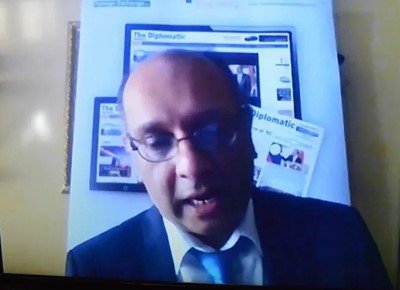
Kirtan Bhana, Director and Founding Editor of The Diplomatic Society
Kirtan Bhana, Director and Founding Editor of The Diplomatic Society, believes that COVID-19 has had a clear and devastating effect on media, in particular print media. Many titles have shut down and the staff has to endure pay cuts, which in turn, influences people's access to pandemic-related information.

He Wenping, Senior Researcher of China-Africa Institute
He Wenping, Senior Researcher of China-Africa Institute, noted that the media has a powerful role. "If the media fails to report in a comprehensive and just manner, it may generate very serious consequences," she said.
She cited the rumor that African people in Guangzhou, south China's Guangdong Province, were mistreated during the epidemic. "After the investigation showed that it was not true, the media should cover this so as to correct their previous false reports and eliminate the impact on the society as a whole, instead of turning a blind eye to that," she noted.
She said that social media should also take responsibilities in this regard. According to her, on social media everyone can be a reporter or a correspondent. They can speak for themselves and report on what happens around them.
"Social media users, especially those with a large number of followers, should make necessary research before they publicize their ideas on social media platforms, so as to make their information accurate and objective," she noted.
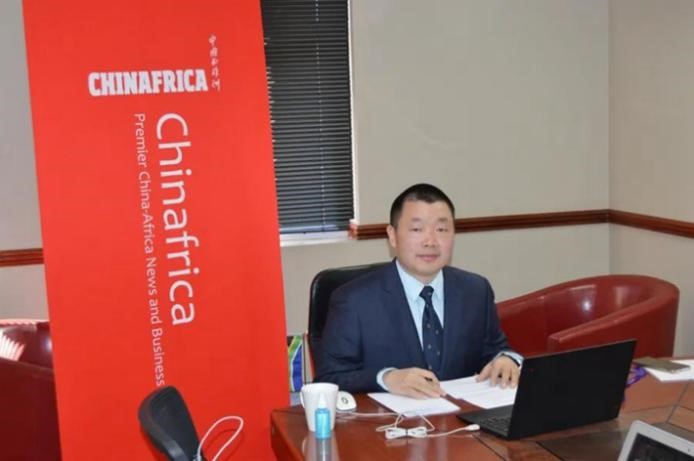
The China-Africa media webinar is hosted by ChinAfrica magazine and co-organized by People's Daily Online
More than 20 representatives of the media attended the webinar, including those from The Citizen and Business Times in South Africa, People's Daily, Xinhua News Agency, China Central Television, China News Service, China Radio International, Science and Technology Daily and Economic Daily in China.
 Fire brigade in Shanghai holds group wedding
Fire brigade in Shanghai holds group wedding Tourists enjoy ice sculptures in Datan Town, north China
Tourists enjoy ice sculptures in Datan Town, north China Sunset scenery of Dayan Pagoda in Xi'an
Sunset scenery of Dayan Pagoda in Xi'an Tourists have fun at scenic spot in Nanlong Town, NW China
Tourists have fun at scenic spot in Nanlong Town, NW China Harbin attracts tourists by making best use of ice in winter
Harbin attracts tourists by making best use of ice in winter In pics: FIS Alpine Ski Women's World Cup Slalom
In pics: FIS Alpine Ski Women's World Cup Slalom Black-necked cranes rest at reservoir in Lhunzhub County, Lhasa
Black-necked cranes rest at reservoir in Lhunzhub County, Lhasa China's FAST telescope will be available to foreign scientists in April
China's FAST telescope will be available to foreign scientists in April "She power" plays indispensable role in poverty alleviation
"She power" plays indispensable role in poverty alleviation Top 10 world news events of People's Daily in 2020
Top 10 world news events of People's Daily in 2020 Top 10 China news events of People's Daily in 2020
Top 10 China news events of People's Daily in 2020 Top 10 media buzzwords of 2020
Top 10 media buzzwords of 2020 Year-ender:10 major tourism stories of 2020
Year-ender:10 major tourism stories of 2020 No interference in Venezuelan issues
No interference in Venezuelan issues
 Biz prepares for trade spat
Biz prepares for trade spat
 Broadcasting Continent
Broadcasting Continent Australia wins Chinese CEOs as US loses
Australia wins Chinese CEOs as US loses